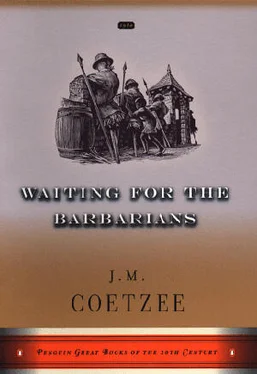A MAN SITS AT MY desk in the office behind the courtroom. I have never seen him before but the insignia on his lilac-blue tunic tell me that he belongs to the Third Bureau of the Civil Guard. A pile of brown folders tied with pink tapes lies at his elbow; one is open before him. I recognize the folders: they contain records of taxes and levies dating back fifty years. Can he really be examining them? What is he looking for? I speak: "Is there anything I can help you with?"
He ignores me, and the two stiff soldiers who guard me might as well be made of wood. I am far from complaining. After my weeks in the desert it is no hardship to stand idle. Besides, I sense a faraway tinge of exultation at the prospect that the false friendship between myself and the Bureau may be coming to an end.
"May I speak to Colonel Joll?" I say. A shot in the dark: who is to say that Joll has returned?
He does not answer, continuing his pretence of reading the documents. He is a good-looking man, with regular white teeth and lovely blue eyes. But vain, I think. I picture him sitting up in bed beside a girl, flexing his muscles for her, feeding on her admiration. The kind of man who drives his body like a machine, I imagine, ignorant that it has its own rhythms. When he looks at me, as he will in a moment, he will look from behind that handsome immobile face and through those clear eyes as an actor looks from behind a mask.
He looks up from the page. It is just as I thought. "Where have you been?" he says.
"I have been away on a long journey. It pains me that I was not here when you arrived to offer you hospitality. But now I am back, and all that is mine is yours."
His insignia say that he is a warrant officer. Warrant Officer in the Third Bureau: what does that mean? At a guess, five years of kicking and beating people; contempt for the regular police and for due process of law; a detestation of smooth patrician talk like mine. But perhaps I do him an injustice-I have been away from the capital for a long time.
"You have been treasonously consorting with the enemy," he says.
So it is out. "Treasonously consorting": a phrase out of a book.
"We are at peace here," I say, "we have no enemies." There is silence. "Unless I make a mistake," I say. "Unless we are the enemy."
I am not sure that he understands me. "The natives are at war with us," he says. I doubt that he has ever set eyes on a barbarian in his life. "Why have you been consorting with them? Who gave you permission to leave your post?"
I shrug off the provocation. "It is a private matter," I say. "You will have to take my word for that. I do not intend to discuss it. Except to say that the magistracy of a district is not a post that can be abandoned like a gatepost."
There is a spring in my walk as I am marched away to confinement between my two guards. "I hope you will allow me to wash," I say, but they ignore me. Never mind.
I am aware of the source of my elation: my alliance with the guardians of the Empire is over, I have set myself in opposition, the bond is broken, I am a free man. Who would not smile? But what a dangerous joy! It should not be so easy to attain salvation. And is there any principle behind my opposition? Have I not simply been provoked into a reaction by the sight of one of the new barbarians usurping my desk and pawing my papers? As for this liberty which I am in the process of throwing away, what value does it have to me? Have I truly enjoyed the unbounded freedom of this past year in which more than ever before my life has been mine to make up as I go along? For example: my freedom to make of the girl whatever I felt like, wife or concubine or daughter or slave or all at once or none, at whim, because I had no duty to her save what it occurred to me to feel from moment to moment: from the oppression of such freedom who would not welcome the liberation of confinement? In my opposition there is nothing heroic-let me not for an instant forget that.
It is the same room in the barracks that they used for their interrogations last year. I stand by while the mats and rolls of the soldiers who have been sleeping here are dragged out and piled at the door. My own three men, still filthy and ragged, emerge from the kitchen to stare. "What is that you are eating?" I shout. "Get me some before they lock me up!" One of them comes trotting over with his bowl of hot millet gruel. "Take it," he says. The guards motion me to go in. "Just a moment," I say: "let him fetch my bedroll, then I won't trouble you again." They wait while I stand in a patch of sunlight spooning in the gruel like a starving man. The boy with the sore foot stands at my elbow with a bowl of tea, smiling. "Thank you," I say. "Don't be anxious, they won't harm you, you were only doing what you were told." With my bedroll and the old bear-fur under my arm I enter my cell. The soot-marks are still on the wall where the brazier used to stand. The door closes and darkness falls.
I sleep all day and all night, barely disturbed by the chop-chop of picks behind the wall at my head or the faraway rumble of barrows and shouts of labourers. In my dreams I am again in the desert, plodding through endless space towards an obscure goal. I sigh and wet my lips. "What is that noise?" I ask when the guard brings my food. They are tearing down the houses built against the south wall of the barracks, he tells me: they are going to extend the barracks and build proper cells. "Ah yes," I say: "time for the black flower of civilization to bloom." He does not understand.
There is no window, only a hole high on the wall. But after a day or two my eyes have adjusted to the gloom. I have to shield myself against the light when, morning and evening, the door is flung open and I am fed. The best hour is early morning, when I wake and lie listening to the first birdsong outside, watching the square of the smoke-hole for the instant at which darkness gives way to the first dove-grey light.
I am fed the same rations as the common soldiers. Every second day the barracks gate is locked for an hour and I am let out to wash and exercise. There are always faces pressed against the bars of the gate gaping at the spectacle of the fall of the once mighty. Many I recognize; but no one greets me.
At night when everything is still the cockroaches come out to explore. I hear, or perhaps imagine, the horny clicking of their wings, the scurry of their feet across the paved floor. They are lured by the smell of the bucket in the corner, the morsels of food on the floor; no doubt too by this mountain of flesh giving off its multifarious odours of life and decay. One night I am awoken by the feather-light tread of one crossing my throat. Thereafter I often jerk awake during the night, twitching, brushing myself off, feeling the phantom probings of their antennae at my lips, my eyes. From such beginnings grow obsessions: I am warned.
I stare all day at the empty walls, unable to believe that the imprint of all the pain and degradation they have enclosed will not materialize under an intent enough gaze; or shut my eyes, trying to attune my hearing to that infinitely faint level at which the cries of all who suffered here must still beat from wall to wall. I pray for the day when these walls will be levelled and the unquiet echoes can finally take wing; though it is hard to ignore the sound of brick being laid on brick so nearby.
I look forward with craving to exercise times, when I can feel the wind on my face and the earth under my soles, see other faces and hear human speech. After two days of solitude my lips feel slack and useless, my own speech seems strange to me. Truly, man was not made to live alone! I build my day unreasonably around the hours when I am fed. I guzzle my food like a dog. A bestial life is turning me into a beast.
Читать дальше












